Why Social Theory Matters: Perspectives on Public Health (POPH90245)
VerifiedAdded on 2023/06/09
|8
|2097
|181
Essay
AI Summary
This essay examines the importance of social theory in public health, defining both concepts and illustrating how social theories provide valuable frameworks for understanding health behaviors and addressing public health issues. It highlights how social determinants, as identified by the World Health Organization, significantly influence individual and community health. The essay uses examples such as the unintended consequences of social actions, the social construction of reality, and the concept of social suffering to demonstrate how these theories can be applied to analyze and improve public health interventions. It argues that by understanding the social context of health, professionals can develop more effective strategies to promote health equity, accessibility, and overall well-being.
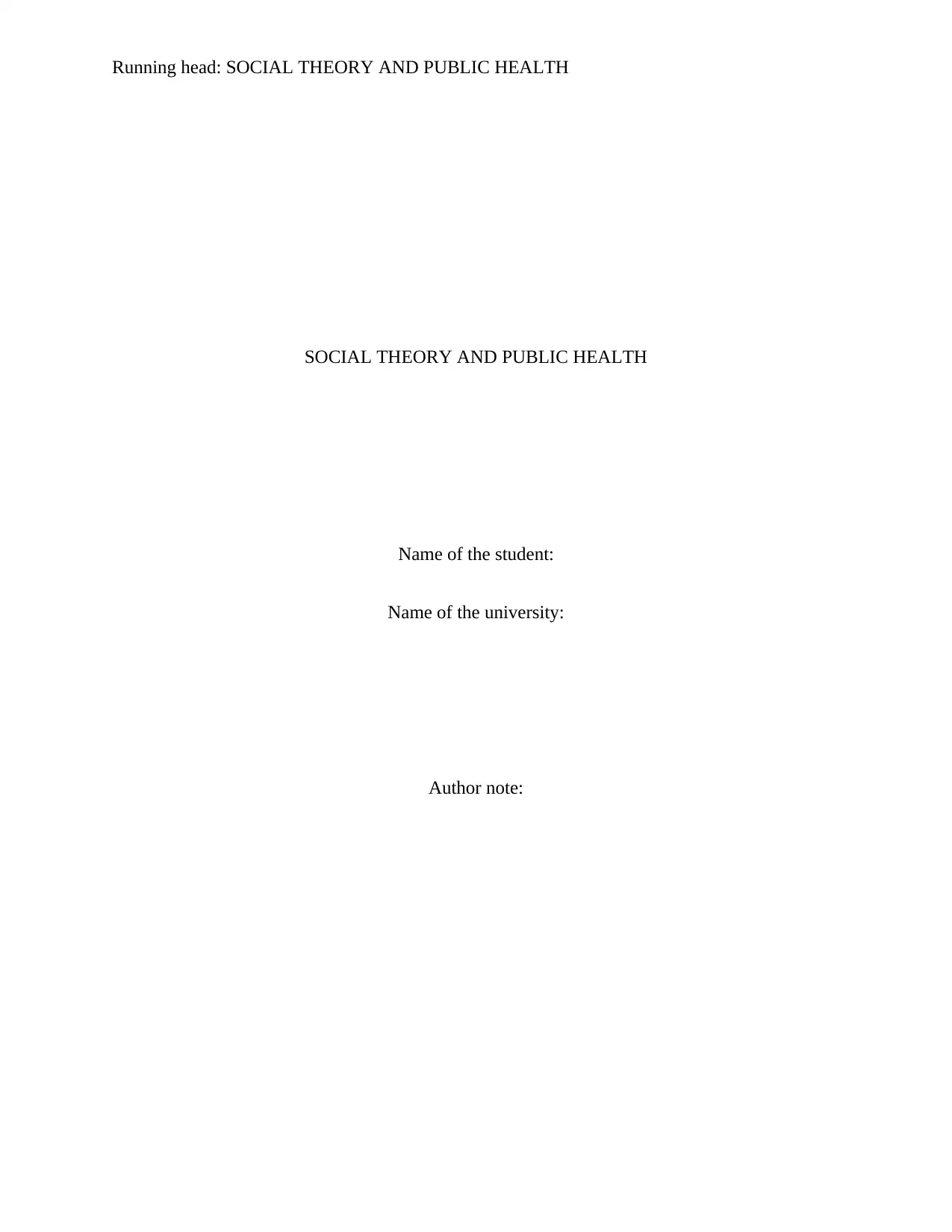
Running head: SOCIAL THEORY AND PUBLIC HEALTH
SOCIAL THEORY AND PUBLIC HEALTH
Name of the student:
Name of the university:
Author note:
SOCIAL THEORY AND PUBLIC HEALTH
Name of the student:
Name of the university:
Author note:
Paraphrase This Document
Need a fresh take? Get an instant paraphrase of this document with our AI Paraphraser
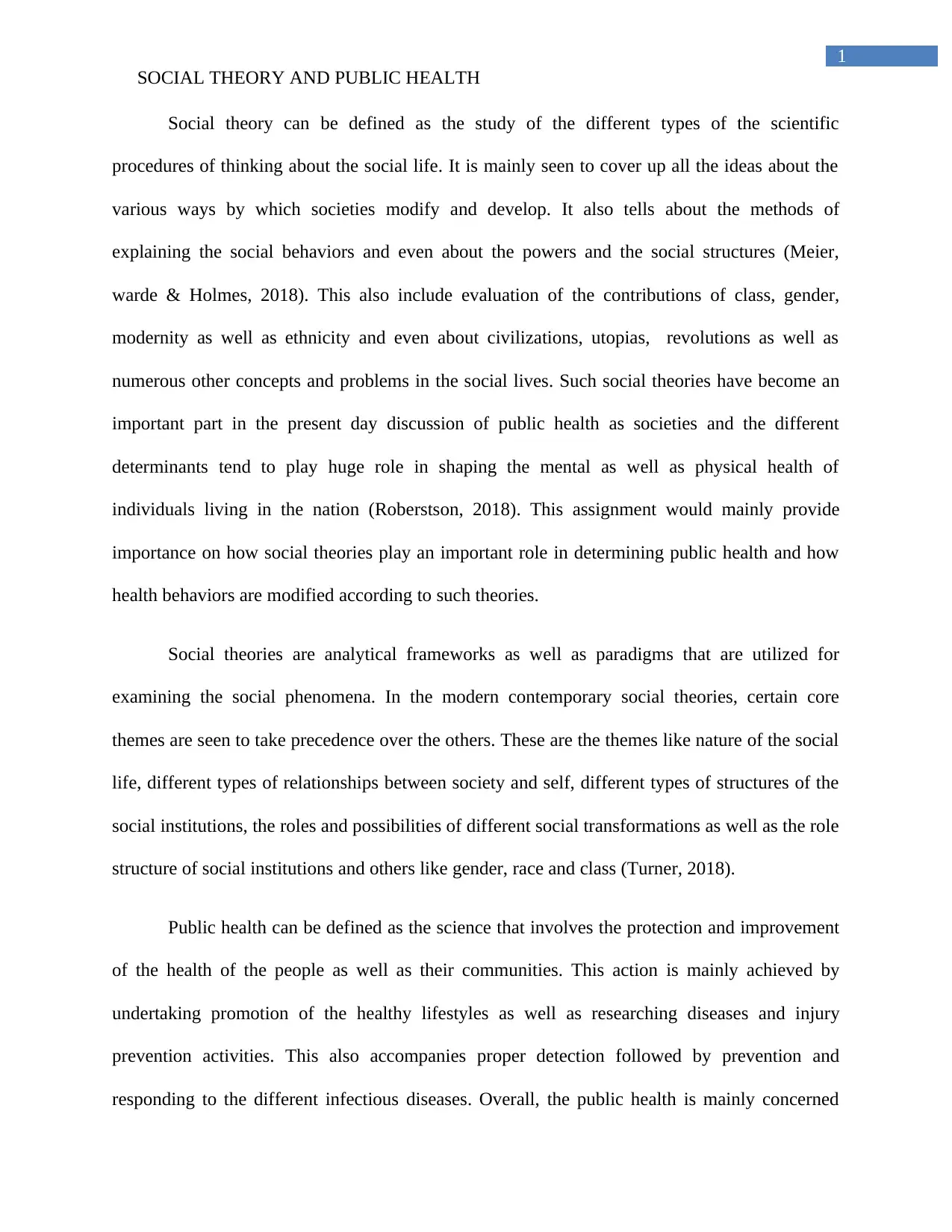
1
SOCIAL THEORY AND PUBLIC HEALTH
Social theory can be defined as the study of the different types of the scientific
procedures of thinking about the social life. It is mainly seen to cover up all the ideas about the
various ways by which societies modify and develop. It also tells about the methods of
explaining the social behaviors and even about the powers and the social structures (Meier,
warde & Holmes, 2018). This also include evaluation of the contributions of class, gender,
modernity as well as ethnicity and even about civilizations, utopias, revolutions as well as
numerous other concepts and problems in the social lives. Such social theories have become an
important part in the present day discussion of public health as societies and the different
determinants tend to play huge role in shaping the mental as well as physical health of
individuals living in the nation (Roberstson, 2018). This assignment would mainly provide
importance on how social theories play an important role in determining public health and how
health behaviors are modified according to such theories.
Social theories are analytical frameworks as well as paradigms that are utilized for
examining the social phenomena. In the modern contemporary social theories, certain core
themes are seen to take precedence over the others. These are the themes like nature of the social
life, different types of relationships between society and self, different types of structures of the
social institutions, the roles and possibilities of different social transformations as well as the role
structure of social institutions and others like gender, race and class (Turner, 2018).
Public health can be defined as the science that involves the protection and improvement
of the health of the people as well as their communities. This action is mainly achieved by
undertaking promotion of the healthy lifestyles as well as researching diseases and injury
prevention activities. This also accompanies proper detection followed by prevention and
responding to the different infectious diseases. Overall, the public health is mainly concerned
SOCIAL THEORY AND PUBLIC HEALTH
Social theory can be defined as the study of the different types of the scientific
procedures of thinking about the social life. It is mainly seen to cover up all the ideas about the
various ways by which societies modify and develop. It also tells about the methods of
explaining the social behaviors and even about the powers and the social structures (Meier,
warde & Holmes, 2018). This also include evaluation of the contributions of class, gender,
modernity as well as ethnicity and even about civilizations, utopias, revolutions as well as
numerous other concepts and problems in the social lives. Such social theories have become an
important part in the present day discussion of public health as societies and the different
determinants tend to play huge role in shaping the mental as well as physical health of
individuals living in the nation (Roberstson, 2018). This assignment would mainly provide
importance on how social theories play an important role in determining public health and how
health behaviors are modified according to such theories.
Social theories are analytical frameworks as well as paradigms that are utilized for
examining the social phenomena. In the modern contemporary social theories, certain core
themes are seen to take precedence over the others. These are the themes like nature of the social
life, different types of relationships between society and self, different types of structures of the
social institutions, the roles and possibilities of different social transformations as well as the role
structure of social institutions and others like gender, race and class (Turner, 2018).
Public health can be defined as the science that involves the protection and improvement
of the health of the people as well as their communities. This action is mainly achieved by
undertaking promotion of the healthy lifestyles as well as researching diseases and injury
prevention activities. This also accompanies proper detection followed by prevention and
responding to the different infectious diseases. Overall, the public health is mainly concerned
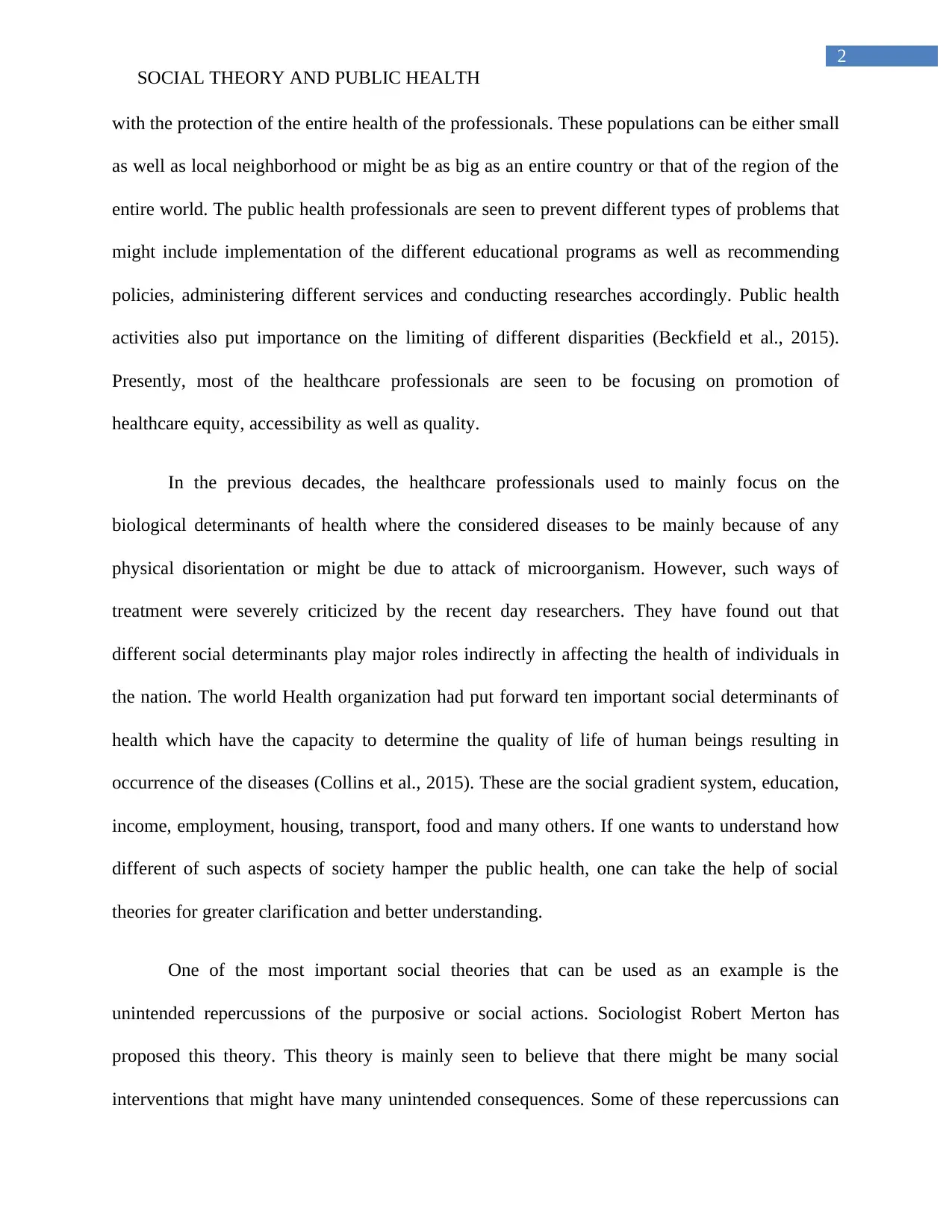
2
SOCIAL THEORY AND PUBLIC HEALTH
with the protection of the entire health of the professionals. These populations can be either small
as well as local neighborhood or might be as big as an entire country or that of the region of the
entire world. The public health professionals are seen to prevent different types of problems that
might include implementation of the different educational programs as well as recommending
policies, administering different services and conducting researches accordingly. Public health
activities also put importance on the limiting of different disparities (Beckfield et al., 2015).
Presently, most of the healthcare professionals are seen to be focusing on promotion of
healthcare equity, accessibility as well as quality.
In the previous decades, the healthcare professionals used to mainly focus on the
biological determinants of health where the considered diseases to be mainly because of any
physical disorientation or might be due to attack of microorganism. However, such ways of
treatment were severely criticized by the recent day researchers. They have found out that
different social determinants play major roles indirectly in affecting the health of individuals in
the nation. The world Health organization had put forward ten important social determinants of
health which have the capacity to determine the quality of life of human beings resulting in
occurrence of the diseases (Collins et al., 2015). These are the social gradient system, education,
income, employment, housing, transport, food and many others. If one wants to understand how
different of such aspects of society hamper the public health, one can take the help of social
theories for greater clarification and better understanding.
One of the most important social theories that can be used as an example is the
unintended repercussions of the purposive or social actions. Sociologist Robert Merton has
proposed this theory. This theory is mainly seen to believe that there might be many social
interventions that might have many unintended consequences. Some of these repercussions can
SOCIAL THEORY AND PUBLIC HEALTH
with the protection of the entire health of the professionals. These populations can be either small
as well as local neighborhood or might be as big as an entire country or that of the region of the
entire world. The public health professionals are seen to prevent different types of problems that
might include implementation of the different educational programs as well as recommending
policies, administering different services and conducting researches accordingly. Public health
activities also put importance on the limiting of different disparities (Beckfield et al., 2015).
Presently, most of the healthcare professionals are seen to be focusing on promotion of
healthcare equity, accessibility as well as quality.
In the previous decades, the healthcare professionals used to mainly focus on the
biological determinants of health where the considered diseases to be mainly because of any
physical disorientation or might be due to attack of microorganism. However, such ways of
treatment were severely criticized by the recent day researchers. They have found out that
different social determinants play major roles indirectly in affecting the health of individuals in
the nation. The world Health organization had put forward ten important social determinants of
health which have the capacity to determine the quality of life of human beings resulting in
occurrence of the diseases (Collins et al., 2015). These are the social gradient system, education,
income, employment, housing, transport, food and many others. If one wants to understand how
different of such aspects of society hamper the public health, one can take the help of social
theories for greater clarification and better understanding.
One of the most important social theories that can be used as an example is the
unintended repercussions of the purposive or social actions. Sociologist Robert Merton has
proposed this theory. This theory is mainly seen to believe that there might be many social
interventions that might have many unintended consequences. Some of these repercussions can
⊘ This is a preview!⊘
Do you want full access?
Subscribe today to unlock all pages.

Trusted by 1+ million students worldwide
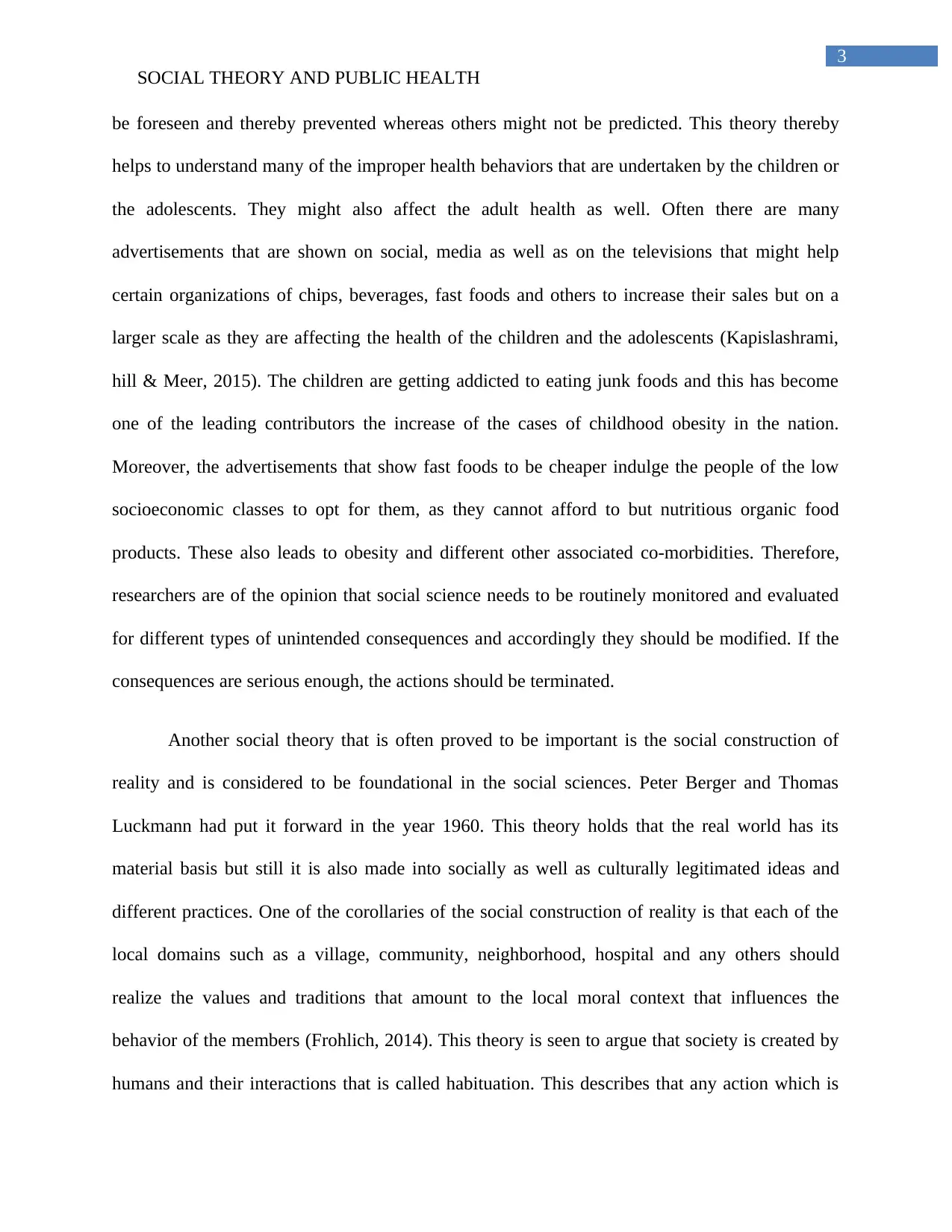
3
SOCIAL THEORY AND PUBLIC HEALTH
be foreseen and thereby prevented whereas others might not be predicted. This theory thereby
helps to understand many of the improper health behaviors that are undertaken by the children or
the adolescents. They might also affect the adult health as well. Often there are many
advertisements that are shown on social, media as well as on the televisions that might help
certain organizations of chips, beverages, fast foods and others to increase their sales but on a
larger scale as they are affecting the health of the children and the adolescents (Kapislashrami,
hill & Meer, 2015). The children are getting addicted to eating junk foods and this has become
one of the leading contributors the increase of the cases of childhood obesity in the nation.
Moreover, the advertisements that show fast foods to be cheaper indulge the people of the low
socioeconomic classes to opt for them, as they cannot afford to but nutritious organic food
products. These also leads to obesity and different other associated co-morbidities. Therefore,
researchers are of the opinion that social science needs to be routinely monitored and evaluated
for different types of unintended consequences and accordingly they should be modified. If the
consequences are serious enough, the actions should be terminated.
Another social theory that is often proved to be important is the social construction of
reality and is considered to be foundational in the social sciences. Peter Berger and Thomas
Luckmann had put it forward in the year 1960. This theory holds that the real world has its
material basis but still it is also made into socially as well as culturally legitimated ideas and
different practices. One of the corollaries of the social construction of reality is that each of the
local domains such as a village, community, neighborhood, hospital and any others should
realize the values and traditions that amount to the local moral context that influences the
behavior of the members (Frohlich, 2014). This theory is seen to argue that society is created by
humans and their interactions that is called habituation. This describes that any action which is
SOCIAL THEORY AND PUBLIC HEALTH
be foreseen and thereby prevented whereas others might not be predicted. This theory thereby
helps to understand many of the improper health behaviors that are undertaken by the children or
the adolescents. They might also affect the adult health as well. Often there are many
advertisements that are shown on social, media as well as on the televisions that might help
certain organizations of chips, beverages, fast foods and others to increase their sales but on a
larger scale as they are affecting the health of the children and the adolescents (Kapislashrami,
hill & Meer, 2015). The children are getting addicted to eating junk foods and this has become
one of the leading contributors the increase of the cases of childhood obesity in the nation.
Moreover, the advertisements that show fast foods to be cheaper indulge the people of the low
socioeconomic classes to opt for them, as they cannot afford to but nutritious organic food
products. These also leads to obesity and different other associated co-morbidities. Therefore,
researchers are of the opinion that social science needs to be routinely monitored and evaluated
for different types of unintended consequences and accordingly they should be modified. If the
consequences are serious enough, the actions should be terminated.
Another social theory that is often proved to be important is the social construction of
reality and is considered to be foundational in the social sciences. Peter Berger and Thomas
Luckmann had put it forward in the year 1960. This theory holds that the real world has its
material basis but still it is also made into socially as well as culturally legitimated ideas and
different practices. One of the corollaries of the social construction of reality is that each of the
local domains such as a village, community, neighborhood, hospital and any others should
realize the values and traditions that amount to the local moral context that influences the
behavior of the members (Frohlich, 2014). This theory is seen to argue that society is created by
humans and their interactions that is called habituation. This describes that any action which is
Paraphrase This Document
Need a fresh take? Get an instant paraphrase of this document with our AI Paraphraser
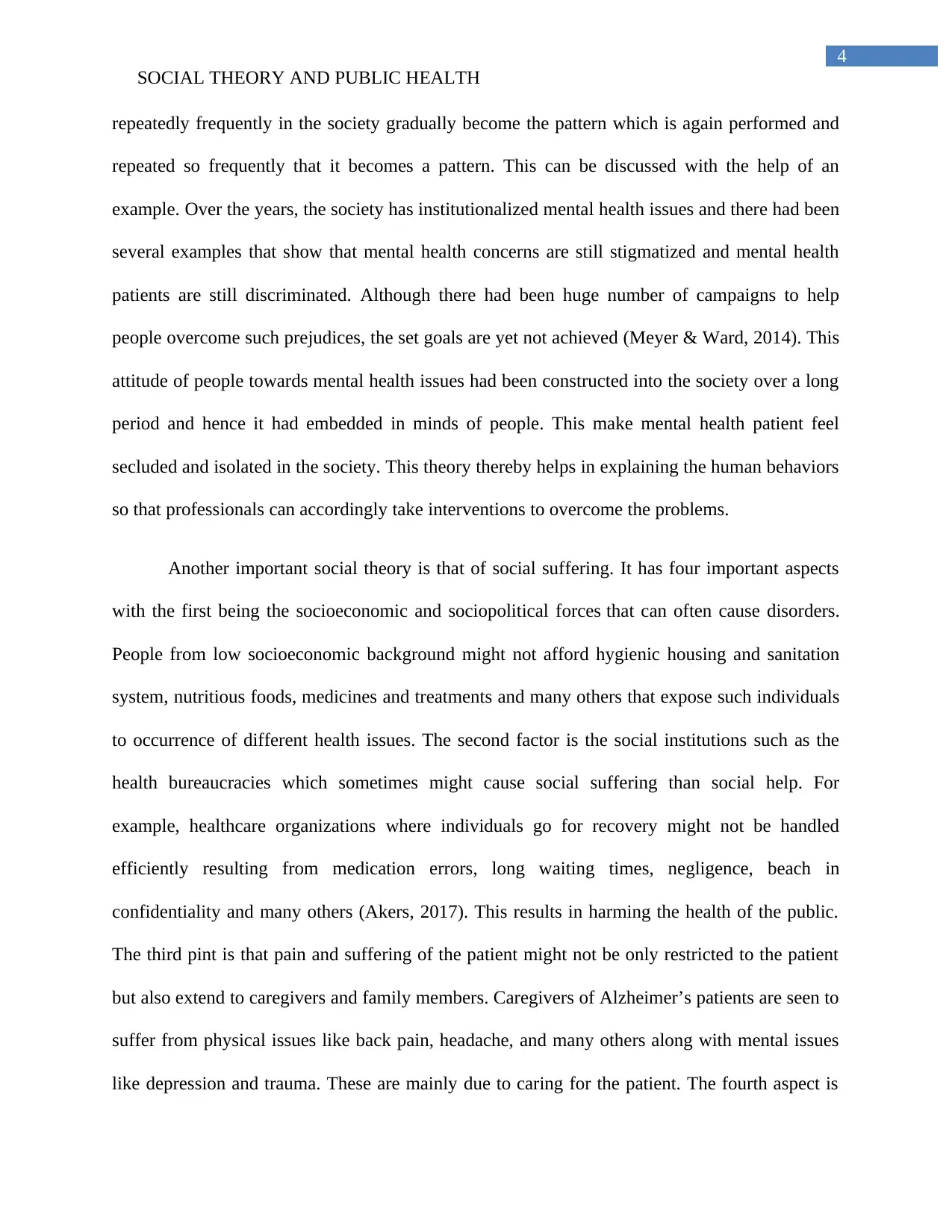
4
SOCIAL THEORY AND PUBLIC HEALTH
repeatedly frequently in the society gradually become the pattern which is again performed and
repeated so frequently that it becomes a pattern. This can be discussed with the help of an
example. Over the years, the society has institutionalized mental health issues and there had been
several examples that show that mental health concerns are still stigmatized and mental health
patients are still discriminated. Although there had been huge number of campaigns to help
people overcome such prejudices, the set goals are yet not achieved (Meyer & Ward, 2014). This
attitude of people towards mental health issues had been constructed into the society over a long
period and hence it had embedded in minds of people. This make mental health patient feel
secluded and isolated in the society. This theory thereby helps in explaining the human behaviors
so that professionals can accordingly take interventions to overcome the problems.
Another important social theory is that of social suffering. It has four important aspects
with the first being the socioeconomic and sociopolitical forces that can often cause disorders.
People from low socioeconomic background might not afford hygienic housing and sanitation
system, nutritious foods, medicines and treatments and many others that expose such individuals
to occurrence of different health issues. The second factor is the social institutions such as the
health bureaucracies which sometimes might cause social suffering than social help. For
example, healthcare organizations where individuals go for recovery might not be handled
efficiently resulting from medication errors, long waiting times, negligence, beach in
confidentiality and many others (Akers, 2017). This results in harming the health of the public.
The third pint is that pain and suffering of the patient might not be only restricted to the patient
but also extend to caregivers and family members. Caregivers of Alzheimer’s patients are seen to
suffer from physical issues like back pain, headache, and many others along with mental issues
like depression and trauma. These are mainly due to caring for the patient. The fourth aspect is
SOCIAL THEORY AND PUBLIC HEALTH
repeatedly frequently in the society gradually become the pattern which is again performed and
repeated so frequently that it becomes a pattern. This can be discussed with the help of an
example. Over the years, the society has institutionalized mental health issues and there had been
several examples that show that mental health concerns are still stigmatized and mental health
patients are still discriminated. Although there had been huge number of campaigns to help
people overcome such prejudices, the set goals are yet not achieved (Meyer & Ward, 2014). This
attitude of people towards mental health issues had been constructed into the society over a long
period and hence it had embedded in minds of people. This make mental health patient feel
secluded and isolated in the society. This theory thereby helps in explaining the human behaviors
so that professionals can accordingly take interventions to overcome the problems.
Another important social theory is that of social suffering. It has four important aspects
with the first being the socioeconomic and sociopolitical forces that can often cause disorders.
People from low socioeconomic background might not afford hygienic housing and sanitation
system, nutritious foods, medicines and treatments and many others that expose such individuals
to occurrence of different health issues. The second factor is the social institutions such as the
health bureaucracies which sometimes might cause social suffering than social help. For
example, healthcare organizations where individuals go for recovery might not be handled
efficiently resulting from medication errors, long waiting times, negligence, beach in
confidentiality and many others (Akers, 2017). This results in harming the health of the public.
The third pint is that pain and suffering of the patient might not be only restricted to the patient
but also extend to caregivers and family members. Caregivers of Alzheimer’s patients are seen to
suffer from physical issues like back pain, headache, and many others along with mental issues
like depression and trauma. These are mainly due to caring for the patient. The fourth aspect is
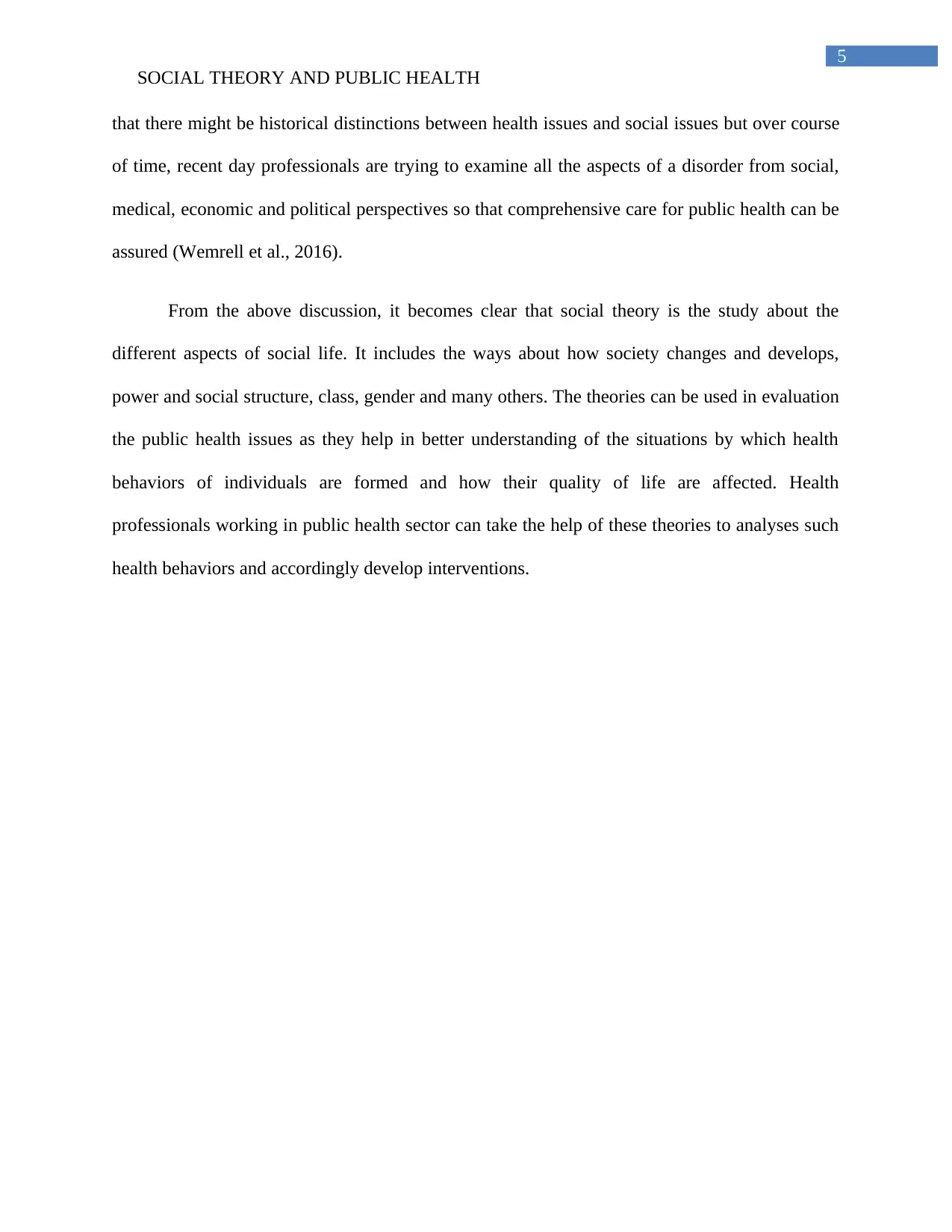
5
SOCIAL THEORY AND PUBLIC HEALTH
that there might be historical distinctions between health issues and social issues but over course
of time, recent day professionals are trying to examine all the aspects of a disorder from social,
medical, economic and political perspectives so that comprehensive care for public health can be
assured (Wemrell et al., 2016).
From the above discussion, it becomes clear that social theory is the study about the
different aspects of social life. It includes the ways about how society changes and develops,
power and social structure, class, gender and many others. The theories can be used in evaluation
the public health issues as they help in better understanding of the situations by which health
behaviors of individuals are formed and how their quality of life are affected. Health
professionals working in public health sector can take the help of these theories to analyses such
health behaviors and accordingly develop interventions.
SOCIAL THEORY AND PUBLIC HEALTH
that there might be historical distinctions between health issues and social issues but over course
of time, recent day professionals are trying to examine all the aspects of a disorder from social,
medical, economic and political perspectives so that comprehensive care for public health can be
assured (Wemrell et al., 2016).
From the above discussion, it becomes clear that social theory is the study about the
different aspects of social life. It includes the ways about how society changes and develops,
power and social structure, class, gender and many others. The theories can be used in evaluation
the public health issues as they help in better understanding of the situations by which health
behaviors of individuals are formed and how their quality of life are affected. Health
professionals working in public health sector can take the help of these theories to analyses such
health behaviors and accordingly develop interventions.
⊘ This is a preview!⊘
Do you want full access?
Subscribe today to unlock all pages.

Trusted by 1+ million students worldwide
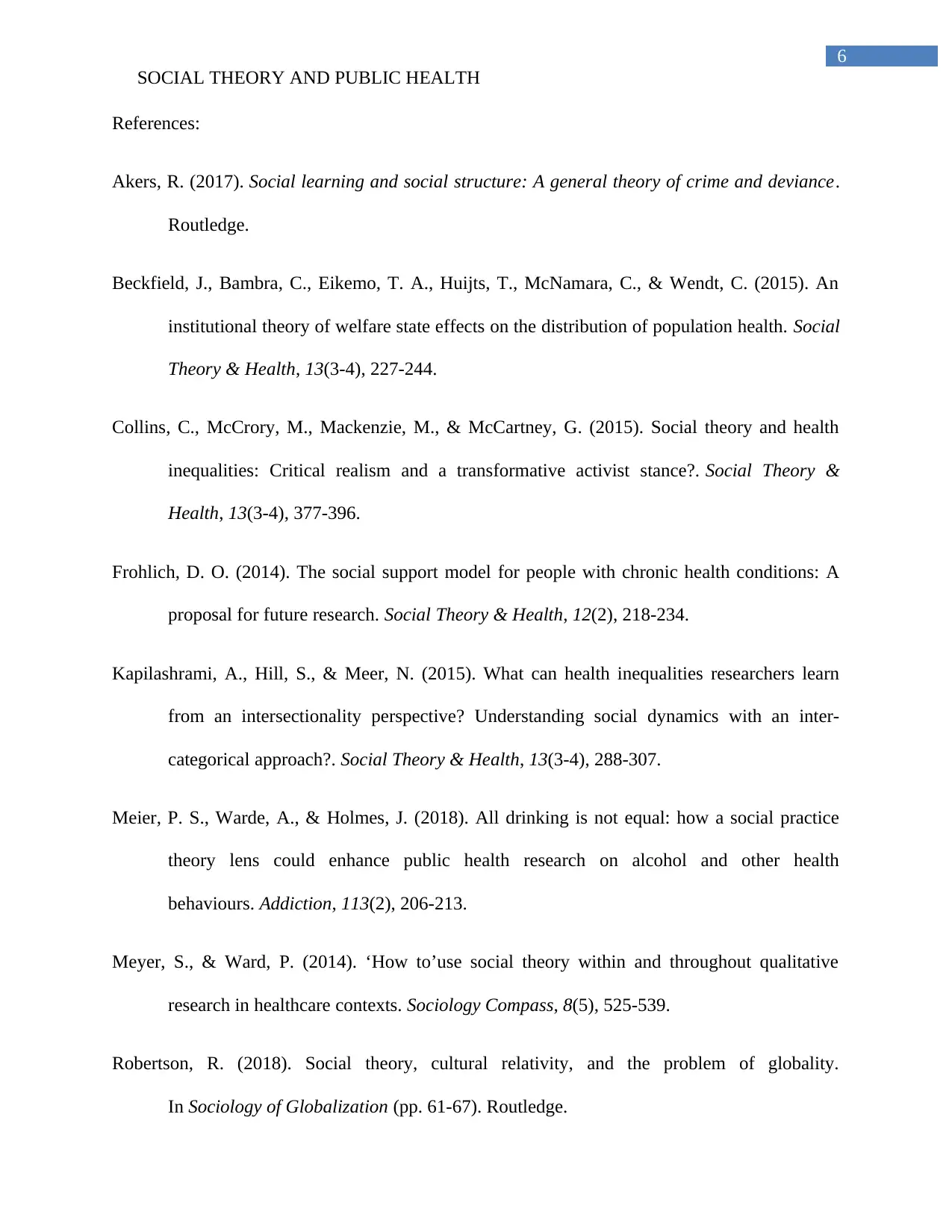
6
SOCIAL THEORY AND PUBLIC HEALTH
References:
Akers, R. (2017). Social learning and social structure: A general theory of crime and deviance.
Routledge.
Beckfield, J., Bambra, C., Eikemo, T. A., Huijts, T., McNamara, C., & Wendt, C. (2015). An
institutional theory of welfare state effects on the distribution of population health. Social
Theory & Health, 13(3-4), 227-244.
Collins, C., McCrory, M., Mackenzie, M., & McCartney, G. (2015). Social theory and health
inequalities: Critical realism and a transformative activist stance?. Social Theory &
Health, 13(3-4), 377-396.
Frohlich, D. O. (2014). The social support model for people with chronic health conditions: A
proposal for future research. Social Theory & Health, 12(2), 218-234.
Kapilashrami, A., Hill, S., & Meer, N. (2015). What can health inequalities researchers learn
from an intersectionality perspective? Understanding social dynamics with an inter-
categorical approach?. Social Theory & Health, 13(3-4), 288-307.
Meier, P. S., Warde, A., & Holmes, J. (2018). All drinking is not equal: how a social practice
theory lens could enhance public health research on alcohol and other health
behaviours. Addiction, 113(2), 206-213.
Meyer, S., & Ward, P. (2014). ‘How to’use social theory within and throughout qualitative
research in healthcare contexts. Sociology Compass, 8(5), 525-539.
Robertson, R. (2018). Social theory, cultural relativity, and the problem of globality.
In Sociology of Globalization (pp. 61-67). Routledge.
SOCIAL THEORY AND PUBLIC HEALTH
References:
Akers, R. (2017). Social learning and social structure: A general theory of crime and deviance.
Routledge.
Beckfield, J., Bambra, C., Eikemo, T. A., Huijts, T., McNamara, C., & Wendt, C. (2015). An
institutional theory of welfare state effects on the distribution of population health. Social
Theory & Health, 13(3-4), 227-244.
Collins, C., McCrory, M., Mackenzie, M., & McCartney, G. (2015). Social theory and health
inequalities: Critical realism and a transformative activist stance?. Social Theory &
Health, 13(3-4), 377-396.
Frohlich, D. O. (2014). The social support model for people with chronic health conditions: A
proposal for future research. Social Theory & Health, 12(2), 218-234.
Kapilashrami, A., Hill, S., & Meer, N. (2015). What can health inequalities researchers learn
from an intersectionality perspective? Understanding social dynamics with an inter-
categorical approach?. Social Theory & Health, 13(3-4), 288-307.
Meier, P. S., Warde, A., & Holmes, J. (2018). All drinking is not equal: how a social practice
theory lens could enhance public health research on alcohol and other health
behaviours. Addiction, 113(2), 206-213.
Meyer, S., & Ward, P. (2014). ‘How to’use social theory within and throughout qualitative
research in healthcare contexts. Sociology Compass, 8(5), 525-539.
Robertson, R. (2018). Social theory, cultural relativity, and the problem of globality.
In Sociology of Globalization (pp. 61-67). Routledge.
Paraphrase This Document
Need a fresh take? Get an instant paraphrase of this document with our AI Paraphraser
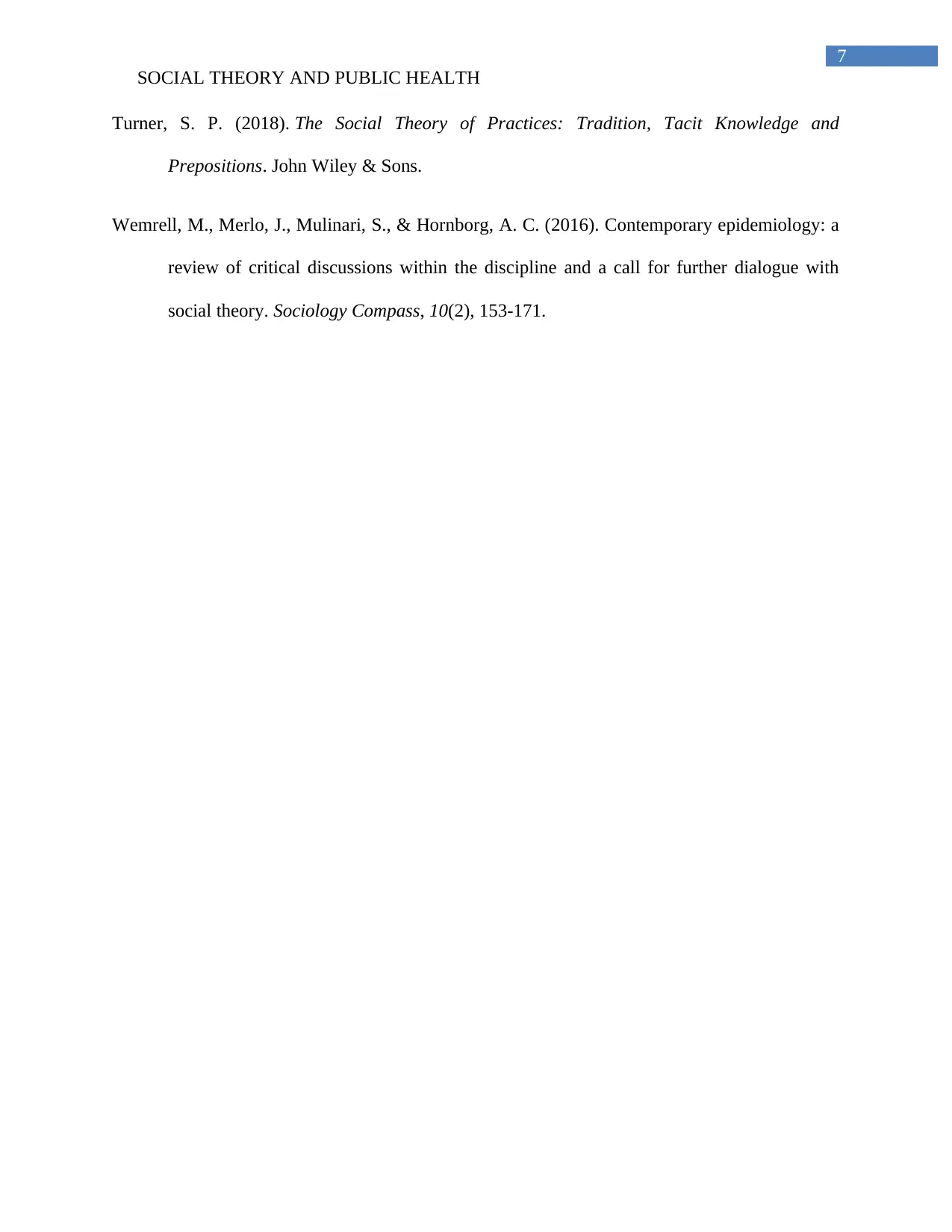
7
SOCIAL THEORY AND PUBLIC HEALTH
Turner, S. P. (2018). The Social Theory of Practices: Tradition, Tacit Knowledge and
Prepositions. John Wiley & Sons.
Wemrell, M., Merlo, J., Mulinari, S., & Hornborg, A. C. (2016). Contemporary epidemiology: a
review of critical discussions within the discipline and a call for further dialogue with
social theory. Sociology Compass, 10(2), 153-171.
SOCIAL THEORY AND PUBLIC HEALTH
Turner, S. P. (2018). The Social Theory of Practices: Tradition, Tacit Knowledge and
Prepositions. John Wiley & Sons.
Wemrell, M., Merlo, J., Mulinari, S., & Hornborg, A. C. (2016). Contemporary epidemiology: a
review of critical discussions within the discipline and a call for further dialogue with
social theory. Sociology Compass, 10(2), 153-171.
1 out of 8
Related Documents
Your All-in-One AI-Powered Toolkit for Academic Success.
+13062052269
info@desklib.com
Available 24*7 on WhatsApp / Email
![[object Object]](/_next/static/media/star-bottom.7253800d.svg)
Unlock your academic potential
Copyright © 2020–2025 A2Z Services. All Rights Reserved. Developed and managed by ZUCOL.





